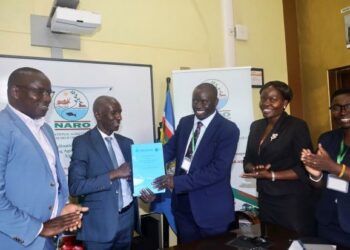Speaker Rebecca Kadaga has called upon Members of Parliament to ‘find solutions to help the Ministry of Agriculture’ fight Salvinia adnata or Kariba weed.
Kariba weed has become a great challenge on lakes Albert and Kyoga hence affecting the economic activities carried out on these lakes’ shores.
“The Agriculture Minister has no solution; can we do what we did in the ninth Parliament for health? Can members get angry and demand for money to clear this weed on the lakes. We must do something during the upcoming Budget,” Kadaga told the House on Thursday.
Kariba weed (Salvinia molesta) is an invasive alien water-weed that was first recorded in Uganda in sheltered bays of Lake Kyoga in June 2013. However, it has become a dangerous common feature on Lake Kyoga and its associated rivers, streams and swamps, and has spread to other lakes notably Kwania and Albert in addition to Lake Kimira in Bugiri District.
In bid to stop this weed, Kadaga this week asked the Minister of Agriculture, Vincent Ssempijja to present a statement on aquatic weed control before the Parliament.
Sempijja said something must be done because Kariba weed is spreading terribly conquering Lake Kyoga and its entire basins
“This new breed of weed adds to the water hyacinth problem which though under control, has resurgence patterns that occasionally threaten the Uganda waters. Kariba weed is considered as one of the world’s worst aquatic weeds. The mat grows to choke waterways, blocking sunlight and oxygen from reaching the waters below, outcompeting other water plants that are beneficial to insects and the fish,” said Sempijja.
According to Sempijja, the weed affects fish breeding and nursery areas consequently reducing the fish stocks on top of affecting other fishing operations. He noted that Egypt has committed US$230,000 for a one year pilot phase project to control the Kariba weed.
Sempijja added that this limited support from Egypt will help the ministry in modifying the existing hyacinth project equipment to suit the mechanical control of the Kariba weed however according parliament this might give delay while weed is occupying other places.
He added that addressing the Kariba weed problem, needs a collective effort involving a wide array of key stakeholders and availability of resources to facilitate the implementation of control strategies.
In 2017, a batch of Salvinia weevils was imported as a specific biological control agents for Kariba weed.
However, the weed seems to keep on growing.
According to the research conducted by National Agricultural Research Organization (NARO) last year in June, it is estimated that the fisheries sector provides direct employment for over 1.2 million people, including fishermen, transporters and traders, but benefits more than 3 million people.
However, the existence of the Kariba weed and other non-native aquatic weeds on the shores of Uganda’s lake has threatened to affect the economic activities performed in these areas which may lead to increased unemployment.
Do you have a story in your community or an opinion to share with us: Email us at editorial@watchdoguganda.com











